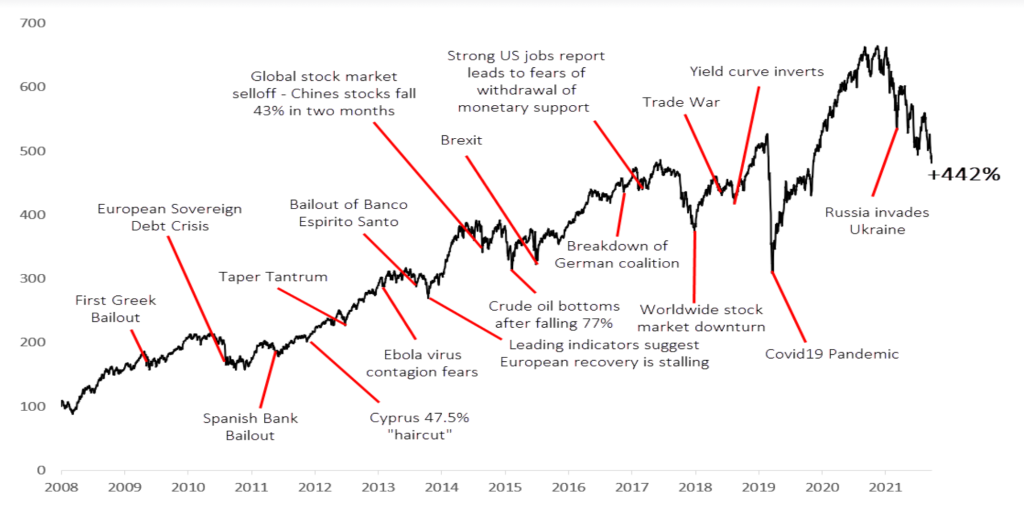03 Nov 2022
Lucy Morris, Director, Portfolio Manager, European Equities | Sam Cosh, Director, Portfolio Manager, European Equities
Are we really living in abnormally volatile times? Is the negative sentiment in markets extreme or warranted? Investment Trusts.
A week used to be considered a long time in politics, given recent events the same could be said about financial markets. Since ex-Chancellor Kwasi Kwarteng’s mini budget on 23 September, it’s been an eventful journey for investors in the UK. Throw into the mix a re-escalation in the Russia/Ukraine war and you could be mistaken for thinking we are living in abnormally volatile times. The reality, however, is that an uneventful global and economic backdrop is a greater exception.
European Assets Trust celebrates its 50th anniversary this year and looking back over that time we can see that since its inception the Trust has navigated clients’ investments through ‘Black Monday’ (the sudden, severe, and largely unexpected global stock market crash on 19 October 1987), civil war in the Balkans in the 1990s and Covid lockdowns from 2020. On a happier note, the last 50 years have also seen the creation and expansion of the European Union (European Council founded in 1976), the fall of the Berlin Wall (1989) and the Good Friday Agreement (1998).
Zooming in on the markets, in the last 14 years (graph below), we can see that despite many challenges, such as the European Sovereign debt crisis, the international crude oil price crashing 77% and more recently the global Covid-19 pandemic, the long-term trend for European equities has remained positive.

Source: Bloomberg and Columbia Threadneedle as at 31 August 2022
The point is, there have always been geopolitical challenges and other unplanned catalysts that trigger instability in financial markets and the backdrop we have now is not as unique as it might feel.
Today, regionally, Europe is confronting the most significant negative impact from the Ukrainian war. The consumer is facing rising energy costs at the same time as food inflation is accelerating, putting huge pressure on disposable incomes. Corporate news flow is deteriorating with industrial and consumer-facing companies releasing profit warnings.
However, Europe’s natural gas challenges are well known, there has been good progress on refilling storage, new LNG imports and reduced consumption. Further, the fiscal impulse from government packages is expected to be stronger in Europe than elsewhere while the European Central Bank is expected to be less aggressive than the US Federal Reserve when it comes to rate rises.
Putting today’s problems into the context of history, we think the negative sentiment is extreme and driving the focus away from fundamentals, resulting in Europe being the biggest underweight as a region for global investors. The PE discount of the Eurozone to the US has never been as large and history shows that big shifts in sentiment have been great opportunities for long-term investments.
Our criteria for new investments is strict. It includes companies being exposed to structural growth, an ability to hold pricing power, margins that can absorb rising costs and growth irrespective of broader economic activity. Productivity providers and automation plays, due to rising input costs, feature in this space. As globalisation fades and the green agenda gains importance, companies that are beneficiaries of investment in local capabilities are also becoming more attractive.
Conversely, we are mindful about energy security and the ESG challenges this could impose long-term. We are also selective about consumer discretionary exposure due to the potential pressure on disposable incomes.
A couple of examples of recent purchases that have met our requirements are detailed below, along with the characteristics that prompted their acquisition.
Regional bank operating in a domestic oligopoly
Bank of Ireland met our investment thesis because it is strong operator in a consolidated market, supported by attractive domestic dynamics; strong GDP growth, a young population and a destination for inward foreign direct investment. The Bank is enjoying attractive loan growth and improving returns on equity which are supported by a strong capital base.
The relative position of the company has improved versus the peer group’s deterioration in mainland Europe and rising interest rates support returns for the bank.
Swiss contract development manufacturing organisation (CDMO)
Siegfried makes small molecules that are components of pharmaceuticals’ medications. The company is well positioned in a market that will see long term non-cyclical growth. Pharmaceutical companies are increasingly outsourcing the production of the molecules they need. This is a difficult market for new entrants as there are significant barriers to entry linked to the requirement for regulatory approval for production plants.
Companies in this sector also stand to benefit from consolidation as larger operators look to take advantage of mergers and acquisitions to improve their positions.
Risk Disclaimer
The value of an investment is dependent on the supply and demand for the shares of the Investment Trust rather than its underlying assets. The value of an investment will not be the same as the value of the Investment Trust’s underlying assets.
Changes in rates of exchange may have an adverse effect on the value, price or income of investments. If markets fall, gearing can magnify the negative impact on performance.
Investments in smaller companies carry a higher degree of risk as their shares may be less liquid and investment values can be volatile.
Views and opinions have been arrived at by Columbia Threadneedle Investments and should not be considered to be a recommendation or solicitation to buy or sell any companies that may be mentioned.